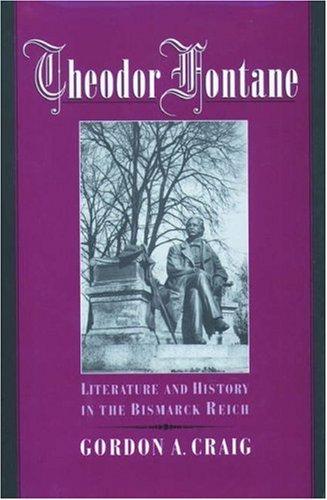232 pages
English language
Published July 18, 1999 by Oxford University Press.

232 pages
English language
Published July 18, 1999 by Oxford University Press.
First published in Germany to popular and critical acclaim, this is a unique portrait of the life and work of Theodor Fontane, the greatest German novelist of his age, as well as a major poet and theater critic and much loved travel writer. Gordon A. Craig, one of the foremost scholars of German history, interpolates a cohesive historical biography of Fontane with his own reflections on the art, culture, and politics of Fontane’s world.
The ideas and impressions of Fontane and Craig echo one another throughout the book in compelling and fascinating ways. Fontane’s travel accounts of Scotland and Prussia are enriched by Craig’s discussion of Germany’s increasingly national vision of itself and the world at the time of unification. Similarly, Craig’s mastery of German military history dovetails remarkably well with Fontane’s reportage on Germany’s wars with Denmark, Austria, and France. Interesting are Fontane’s ruminations over his great contemporary …
First published in Germany to popular and critical acclaim, this is a unique portrait of the life and work of Theodor Fontane, the greatest German novelist of his age, as well as a major poet and theater critic and much loved travel writer. Gordon A. Craig, one of the foremost scholars of German history, interpolates a cohesive historical biography of Fontane with his own reflections on the art, culture, and politics of Fontane’s world.
The ideas and impressions of Fontane and Craig echo one another throughout the book in compelling and fascinating ways. Fontane’s travel accounts of Scotland and Prussia are enriched by Craig’s discussion of Germany’s increasingly national vision of itself and the world at the time of unification. Similarly, Craig’s mastery of German military history dovetails remarkably well with Fontane’s reportage on Germany’s wars with Denmark, Austria, and France. Interesting are Fontane’s ruminations over his great contemporary Otto von Bismarck, whom he revered as founder of the Reich but whose policies he feared would in the end be self-defeating.
Although Fontane’s Wanderings through the Mark Brandenburg and his novels are more widely read in Germany today than they were in his own time, and although his masterpiece Effi Briest was the basis for a famous Fassbinder film, Fontane remains little known in the English-speaking world. Theodor Fontane is the ideal introduction to this major European writer, a master of social analysis and one of the great letter writers of his age.